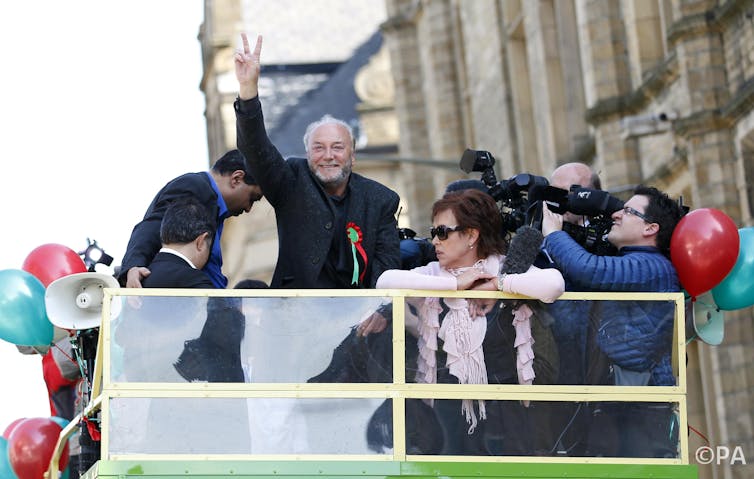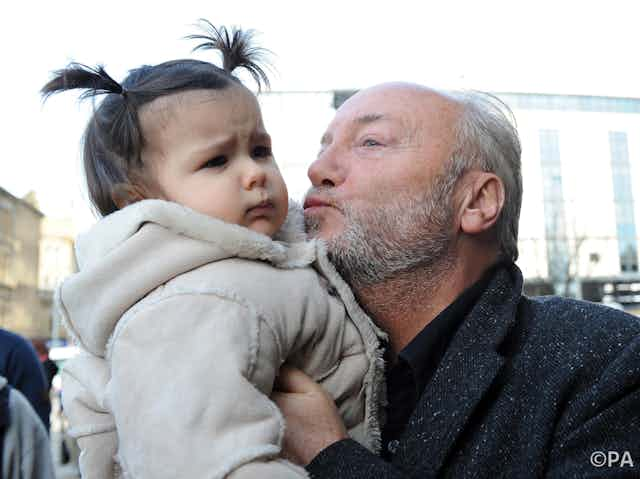The Respect Party, launched 12 years ago as a platform for opposing the Iraq war, has ceased to be. After it lost its only parliamentary seat in the 2015 election, the party has “voluntarily de-registered” from the Electoral Commission.
The demise of the party has led to much speculation about what the future holds for George Galloway – the man who was the party’s leader and its only ever MP. Many now assume he will attempt to rejoin the Labour Party, which has shifted significantly to the left under Jeremy Corbyn. These two parliamentary stalwarts share many political ideals and fought together against the Iraq war in the early 2000s.
Losing Respect
Respect emerged in 2004 out of the anti-war movement. Galloway was a high profile figure and, within the space of just a few months, the party managed to win a quarter of a million votes in the European parliamentary elections. Galloway himself was almost elected as an MEP in London.
A year later he went one better in the 2005 general election and was elected as MP for Bethnal Green and Bow, a constituency with a large Muslim population. More success followed in the 2006 local elections, when Respect became the official opposition on Tower Hamlets council.

But by 2007, the party was beginning to fragment. There was a bitter factional split between Galloway’s supporters and those close to the Socialist Workers Party. Most thought the party was finished and its electoral results in 2010 seemed to confirm this. The party lost Bethnal Green and Bow back to Labour and Galloway failed to get elected in Poplar and Limehouse (he vacated his previous seat for a Bengali candidate, as promised).
However, two years later, Respect had their man back in parliament with a spectacular by-election victory in Bradford West. The Labour Party, confident that this was very much a “safe seat”, lost by more than 10,000 votes. Galloway polled more votes than the other seven candidates put together. Then, three years later, he lost the seat to Labour’s Naz Shah after one of the 2015 general election’s most divisive and bitterly personal campaigns.
The Galloway brand
Galloway alienated many people in Respect, especially women. Salma Yaqoob, one of the original founders of Respect, and the party’s other high-profile politician, cut ties with the party in 2012, citing Galloway’s comments about rape allegations made against Wikileaks founder Julian Assange.
But he was electric on the campaign trail and there is little doubt that Respect’s greatest successes were largely due to his charisma and personal appeal – particularly for young Muslim voters.
Galloway couldn’t always pull it off. A shambolic campaign in the Scottish parliamentary election of 2011 (which delivered just 0.35% of the local vote) and his most recent foray into the 2016 London mayoral election (when he won 1.4% of the vote) showed that without the right issues and electorate to exploit, his rhetoric could only get him so far.
His career in politics has been anything but dull. Serving as an MP between 1987-2010 and 2012-2015 he was also a contestant on Celebrity Big Brother and more recently brought out a film about Tony Blair. He is a household name in British politics; something that cannot be said for most of the politicians serving in Corbyn’s present shadow cabinet.
Galloway has always maintained he was “Old Labour”. He even said so in his 2012 by-election victory speech as leader of the Respect Party. He had been expelled from Labour in 2003, for bringing the party into disrepute over his opposition to the Iraq War. But in 2013 there were rumours that he had been in talks with Labour’s then leader, Ed Miliband, to rejoin.
He again stated his desire to rejoin the party during last year’s leadership election, a move which would have been deeply unpopular with many in the party – especially the Blairites.
If Corbyn stays on as leader – which is widely expected as the 2016 leadership campaign plays out – the balance of power will have shifted resoundingly to the left, paving the way for Galloway to possibly return to the fold. He and Corbyn were both heavily involved in the anti-war movement led by the Stop the War Coalition and Galloway describes Corbyn as his “friend and comrade for over 30 years”. Indeed, Corbyn, alongside other far left comrades, opposed Galloway’s expulsion from the party in the first place.
Respect was founded as a radical alternative to the New Labour project. While its roots were firmly in the anti-war movement, it brought together leftist campaigners on issues ranging from the environment, equal rights and socialism. It rejected the “third way” espoused by Blair during his tenure. But since Corbyn was elected leader, the rationale for a separate party no longer exists.
Friends again?
It’s worth pointing out that Respect’s electoral results make it Britain’s most successful radical left party. These successes may have been restricted to a handful of areas with significant Muslim populations (Birmingham, Bradford, east London) but it managed to do so on a shoestring budget and with a tiny membership. It was able to mobilise previously disenfranchised members of the community to turn out in force to overturn previously safe Labour seats. That should remind Labour of one of the first rules of representative democracy – not to take the electorate, even loyal supporters, for granted.
Respect will go down as a unique electoral experiment. It was derided as a single-issue party but survived for many years after British troops had left Iraq. Under a different electoral system, it would have had even more success.
Who would bet against Galloway standing as a Labour parliamentary candidate again? Given the events in British politics over the last year, and particularly in the Labour Party, anything seems possible.

